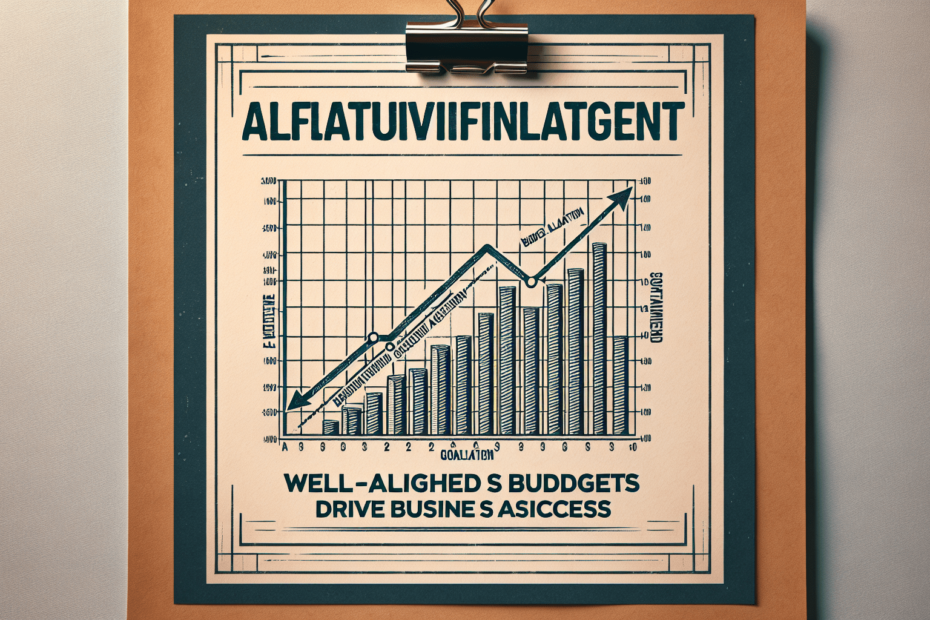So, you’ve got big goals for your business and you’re ready to take the necessary steps to achieve them. But here’s the thing – without a solid budget in place, your goals may remain just dreams. That’s why it’s crucial to ensure that your business budget aligns with your goals effectively. In this article, we’ll explore some practical tips and strategies to help you do just that. From setting clear objectives to regularly reviewing and adjusting your budget, we’ve got you covered. Let’s get started on the path to financial success!

Evaluate Current Financial Situation
Before you can align your business budget with your goals effectively, it’s important to evaluate your current financial situation. This involves analyzing your previous budgeting practices to understand how you’ve been managing your finances in the past. By assessing your current income and expenses, you can get a clear picture of your financial health. Additionally, it’s crucial to identify areas of overspending and evaluate your profit margins to determine the stability and profitability of your business.
Set Clear Business Goals
Once you have evaluated your current financial situation, the next step is to set clear business goals. It’s essential to define both short-term and long-term objectives that align with your overall vision. To ensure that your goals are effective, they need to be specific, measurable, attainable, relevant, and time-bound (SMART). By considering both financial and non-financial goals, you can create a well-rounded framework for your business’s success.
Align Budget with Goals
After defining your goals, the next step is to align your budget with those goals. This involves allocating funds to prioritize the goals you have set. Identify the expenses that directly contribute to achieving your goals and make sure they are adequately funded. If necessary, adjust budget categories to ensure that your financial resources are aligned with your objectives. It’s crucial to track and monitor progress regularly to ensure that your budget stays in line with your goals.
Involve Key Stakeholders
In order to effectively align your budget with your goals, it’s important to involve key stakeholders in the budget planning process. This includes managers and department heads who have a deep understanding of the resources and needs of their respective areas. By obtaining input from employees on budget priorities, you can gain valuable insights and foster a sense of ownership within your team. Additionally, considering customer feedback and market trends can help you make informed budgeting decisions. Collaborating with financial advisors or accountants can also provide valuable guidance and expertise.

Consider Historical Data
To ensure that your budget aligns with your goals effectively, it’s important to consider historical data. Analyzing past financial performance allows you to identify patterns and trends in revenue and expenses. By using this historical data, you can make more accurate forecasts and set realistic budget goals. It’s also important to take into account seasonality and economic fluctuations that may impact your budget. By leveraging historical data, you can make informed decisions that will help you stay on track with your goals.
Employ Zero-Based Budgeting
One effective budgeting strategy is zero-based budgeting. This approach involves starting the budgeting process from scratch each period. By justifying all expenses and allocating funds based on needs and priorities, you can ensure that your budget is optimized for goal achievement. Zero-based budgeting also helps eliminate wasteful spending by requiring thorough evaluation of each expense. This approach encourages budget accountability and ensures that resources are allocated efficiently.

Implement Cost-Cutting Strategies
To align your budget with your goals effectively, it’s important to implement cost-cutting strategies. This involves identifying non-essential expenses that can be reduced or eliminated without negatively impacting your business operations. By negotiating with suppliers for better deals, you can reduce expenses while maintaining quality. Streamlining operations and processes can also help reduce overhead costs. By actively seeking ways to cut costs, you can free up resources to allocate towards your goals.
Invest in Budgeting Tools or Software
Investing in budgeting tools or software can greatly assist in aligning your budget with your goals effectively. Accounting software provides accurate financial tracking, making it easier to manage your budget. Additionally, various budgeting apps and tools are available to help you with effective budget management. These tools can automate processes such as income and expense tracking, saving you time and effort. They also generate reports that make analysis and decision-making easier.

Monitor and Adjust Regularly
Aligning your budget with your goals is an ongoing process that requires regular monitoring and adjustment. It’s important to track your budget performance against your goals to identify any deviations or variances. If you notice any discrepancies, it may be necessary to make adjustments to stay on track. Regularly reviewing and forecasting your future budgets can help you proactively address any potential issues and make necessary changes to ensure that your budget remains aligned with your goals.
Seek Professional Assistance if Needed
If you find aligning your budget with your goals challenging, seeking professional assistance is a viable option. Financial advisors or consultants can provide valuable insights and guidance on budget optimization. By consulting with them, you can benefit from their expertise and experience. Depending on the complexity of your financial situation, you may also consider hiring a CFO or financial analyst who can provide ongoing financial management support. Utilizing external resources can contribute to a holistic approach to aligning your budget with your goals effectively.
In conclusion, aligning your business budget with your goals effectively requires careful evaluation, clear goal-setting, and strategic planning. By analyzing your current financial situation, setting clear goals, involving key stakeholders, considering historical data, employing zero-based budgeting, implementing cost-cutting strategies, investing in budgeting tools, monitoring and adjusting regularly, and seeking professional assistance when needed, you can ensure that your business budget is optimized to achieve your objectives. Remember, aligning your budget with your goals is an ongoing process that requires continuous review and adaptation to ensure long-term success.
